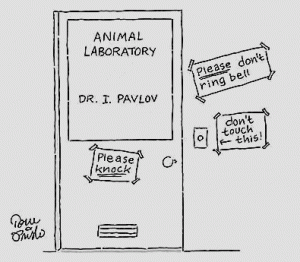
The bells, the bells…
I just listened to a podcast from BBC radio’s Science Stories about Ivan Pavlov and his dog-experiments. Not only are the standard explanation of those experiment vastly simplified to the border of being plain wrong, it turns out that the famous bell was never used at all. But see what I did there! I started talking about Pavlov and his dog-experiments, and everyone was on board immediately. What I didn’t know was that long before measuring dog-drool Pavlov got a Nobel Prize (in 1904) for “his work on the physiology of digestion”. Pavlov is so intimately connected with the conditioned reflexes* that I had no idea that he was a very accomplished and famous scientist before those experiments. I always thought that they were the sole source of his fame.
That got me to think about who else got the Nobel Prize for something that is not what they are mostly associated with.
The canonical example must be Einstein, who did not get the prize for his theory of relativity. Instead he was given the award for his work on the photoelectric effect.
Another famous example is Ernest Rutherford, who despite declaring that “All science is either physics or stamp collecting”, got the Nobel Prize in chemistry “for his investigations into the disintegration of the elements, and the chemistry of radioactive substances”. His most famous work was performed after his award, showing that the atom consists of a small nucleus surrounded by a cloud of electrons.
Off the top of my head I can think of maybe a few more, not quite as obvious, scientists better know for their non-Nobel work. One would be Paul Krugman, who I guess most people know as a writer and columnist in The New York Times. Another might be Richard Feynman, lecturer and all-around funny guy. I think few non-physicists (or many physicists for that matter) know much about his contributions to quantum electrodynamics. A rather sadder case would be Linus Pauling, one of the great scientist of the 20th century whose Nobel Price (one of them!) laid the foundation for quantum chemistry but is now a hero of alternative medicine for his belief in megadosing of Vitamin C.
By carefully reading through the list Nobel Prize-winners maybe a few more could be found†. I guess it depends on the level of famousness we are willing to accept. What about Van der Waals (not for the force)? The problem is that quite few scientists, even the Nobels, are known for anything at all to people outside their immediate field of research, so that limits the pool of those “being known for something else”.
Any more suggestions?
* Which also isn’t what people think it is. I highly recommend the podcast above for an interesting exposure of our misconceptions.
† But it’s late and I can’t really be bothered going through them all.
https://www.youtube.com/watch?v=whwiMrBNWCA